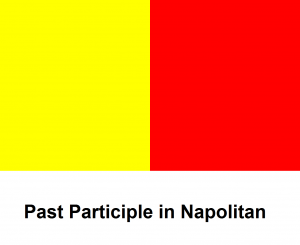Language/Neapolitan/Grammar/Past-Participle-in-Napolitan
Neapolitan, the vibrant and melodic language spoken in the Campania region of Italy, has a rich and fascinating grammatical structure. In this article, we will delve deep into the past participle in Neapolitan, its formation, usage, and irregularities. By the end of this comprehensive guide, you'll have a solid understanding of this essential aspect of Neapolitan grammar.
- Other Napolitan Lessons: Consider broadening your understanding by checking out these related lessons: Possessive Case in Napolitan & Prepositions.
I. Formation of the Past Participle in Neapolitan
In Neapolitan, the past participle is formed by modifying the infinitive form of the verb. Just like in Italian, Neapolitan verbs are categorized into three main conjugation groups, based on the endings of their infinitives: -à, -è, and -ì.
Verbs ending in -à
For verbs ending in -à, the past participle is formed by replacing the -à with -atə.
For example:
- Parlà (to talk) -> Parlàtə (talked)
- Mangià (to eat) -> Mangiàtə (eaten)
Verbs ending in -è
For verbs ending in -è, the past participle is formed by replacing the -è with -utə.
For example:
- Tènè (to have) -> Tənutə (had)
- Vòlè (to want) -> Vòlutə (wanted)
Verbs ending in -ì
For verbs ending in -ì, the past participle is formed by replacing the -ì with -itə.
For example:
- Dìcì (to say) -> Dìcətə (said)
- Venì (to come) -> Venùtə (come)
II. Usage of the Past Participle in Neapolitan
Past Tense with Auxiliary Verbs
In Neapolitan, the past participle is primarily used to form compound tenses. The auxiliary verbs "avè" (to have) or "èssə" (to be) are conjugated to agree with the subject, and the past participle remains unchanged.
Examples:
- I' só avutə fàmə. (I was hungry.)
- Nuje simmə statə a Napule. (We went to Naples.)
Passive Voice
The past participle is also used to form the passive voice. In this case, the verb "èssə" (to be) is conjugated to match the subject, and the past participle agrees in gender and number with the subject.
Examples:
- La letterə è statə scrìttə. (The letter was written.)
- L'omə è statə arrestatə. (The man was arrested.)
As an Adjective
The past participle can also function as an adjective, describing a noun. In this case, it must agree in gender and number with the noun it modifies.
Examples:
- Na fèstə magnificàtə. (A magnificent party.)
- Dduje libbrə leggətə. (Two read books.)
III. Irregular Past Participles in Neapolitan
Some verbs have irregular past participles that don't follow the standard conjugation rules. Here are a few examples of common irregular past participles:
- Essə (to be) -> Statə (been)
- Irə (to go) -> I'tə (gone)
- Vedè (to see) -> Vistə (seen)
More Examples: Some Verbs in the Past Perfect in Napolitan
Verb : to love / amà
| ENGLISH | NAPOLITAN | BRAZILIAN
PORTUGUESE |
|---|---|---|
| I have loved | Io aggio amato | Eu amei |
| You have loved | Tu aje amato | Você amou |
| He has loved | Isso àve / ha amato | Ele amou |
| We have loved | Nuje avimme amato | Nós amamos |
| You have loved | Vuje avite amato | Vocês amaram |
| They have loved | Lloro àveno / hanno amato | Eles amaram |
Verb : to speak / parlà
| ENGLISH | NAPOLITAN | BRAZILIAN
PORTUGUESE |
|---|---|---|
| I have spoken | Io aggio parlato | Eu falei |
| You have spoken | Tu aje parlato | Você falou |
| He has spoken | Isso ha / ave parlato | Ele falou |
| We have spoken | Nuje avimmo parlato | Nós falamos |
| You have spoken | Vuje avite parlato | Vocês falaram |
| They have spoken | Lloro àveno / hanno parlato | Eles falaram |
Verb : to sleep / durmì
| ENGLISH | NAPOLITAN | BRAZILIAN
PORTUGUESE |
|---|---|---|
| I have slept | Io aggio durmuto | Eu dormi |
| You have slept | Tu aje durmuto | Você dormiu |
| He has slept | Isso ave / ha durmuto | Ele dormiu |
| We have slept | Nuje avimmo durmuto | Nós dormimos |
| You have slept | Vuje avite durmuto | Vocês dormiram |
| They have slept | Lloro àveno / hanno durmuto | Eles dormiram |
Verb : to open / arapì
| ENGLISH | NAPOLITAN | BRAZILIAN
PORTUGUESE |
|---|---|---|
| I have opened | Io aggio araputo | Eu abri |
| You have opened | Tu aje araputo | Você abriu |
| He has opened | Isso àve / ha araputo | Ele abriu |
| We have opened | Nuje avimme araputo | Nós abrimos |
| You have opened | Vuje avite araputo | Vocês abriram |
| They have opened | Lloro àveno / hanno araputo | Eles abriram |
Other Lessons
- Past Tense
- Imperative Tense
- Future Tense
- Verbs in Napolitan
- How to Use Be
- Times in Napolitan
- How to Use Have
- Possessive Case in Napolitan
- Pronouns


